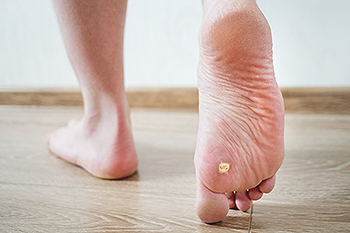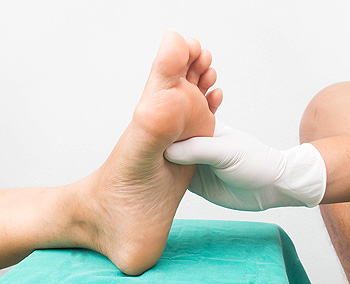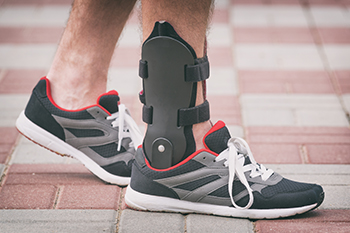Items filtered by date: May 2023
Painful Plantar Warts

People who are afflicted with plantar warts may have difficulty walking. These growths are found on the soles of the feet and can cause severe pain and discomfort. This is a result of the consistent weight the feet endure while walking and standing during the day. Plantar warts are caused by a virus that is known as the human papillomavirus, or HPV. This virus is contagious, and lives in warm and moist environments. These can consist of public swimming pools, locker rooms, and shower room floors. It is beneficial to wear appropriate shoes while in these areas, such as flip flops or water shoes. This type of wart will generally take several weeks or months to completely disappear. Many patients seek treatment to relieve the pain, which may include removal for faster relief. If you have a plantar wart, it is suggested that you speak to a podiatrist who can guide you toward the treatment that is correct for you.
Plantar warts can be very uncomfortable. If you need your feet checked, contact Peter Siroka, DPM from Connecticut. Our doctor will assist you with all of your foot and ankle needs.
About Plantar Warts
Plantar warts are the result of HPV, or human papillomavirus, getting into open wounds on the feet. They are mostly found on the heels or balls of the feet.
While plantar warts are generally harmless, those experiencing excessive pain or those suffering from diabetes or a compromised immune system require immediate medical care. Plantar warts are easily diagnosed, usually through scraping off a bit of rough skin or by getting a biopsy.
Symptoms
- Lesions on the bottom of your feet, usually rough and grainy
- Hard or thick callused spots
- Wart seeds, which are small clotted blood vessels that look like little black spots
- Pain, discomfort, or tenderness of your feet when walking or standing
Treatment
- Freezing
- Electric tool removal
- Laser Treatment
- Topical Creams (prescription only)
- Over-the-counter medications
To help prevent developing plantar warts, avoid walking barefoot over abrasive surfaces that can cause cuts or wounds for HPV to get into. Avoiding direct contact with other warts, as well as not picking or rubbing existing warts, can help prevent the further spread of plantar warts. However, if you think you have developed plantar warts, speak to your podiatrist. He or she can diagnose the warts on your feet and recommend the appropriate treatment options.
If you have any questions please feel free to contact our office located in Stamford, CT . We offer the newest diagnostic and treatment technologies for all your foot and ankle needs.
Warning Signs of Diabetic Neuropathy

Diabetic neuropathy is one of the more serious side effects of maintaining high blood sugar levels for a long period of time. Neuropathy brought on by diabetes is the result of damage to the peripheral nerves, blocking the messages that control sensation to the feet. The effect is numbness, tingling, burning pain, and a reduced ability to detect changes in temperature. Weakness in the lower limbs and feet may result in pain, which can be treated with a number of medications. Infections from sores on the feet are commonly associated with peripheral diabetic neuropathy. In many cases, these sores, cuts, or other injuries to the feet become ulcerated because the patient is unable to detect them. Therefore, taking the time each day to inspect the feet, especially the soles, is imperative to ward off further damage. Increasing the level of exercise is thought to be helpful, and some patients receive pain relief from electro-stimulation treatments. If you have diabetes and are experiencing problems in the feet, it is suggested that you make an appointment with a podiatrist for an exam and treatment options.
Diabetic foot care is important in preventing foot ailments such as ulcers. If you are suffering from diabetes or have any other concerns about your feet, contact Peter Siroka, DPM from Connecticut. Our doctor can provide the care you need to keep you pain-free and on your feet.
Diabetic Foot Care
Diabetes affects millions of people every year. The condition can damage blood vessels in many parts of the body, especially the feet. Because of this, taking care of your feet is essential if you have diabetes, and having a podiatrist help monitor your foot health is highly recommended.
The Importance of Caring for Your Feet
- Routinely inspect your feet for bruises or sores.
- Wear socks that fit your feet comfortably.
- Wear comfortable shoes that provide adequate support.
Patients with diabetes should have their doctor monitor their blood levels, as blood sugar levels play such a huge role in diabetic care. Monitoring these levels on a regular basis is highly advised.
It is always best to inform your healthcare professional of any concerns you may have regarding your feet, especially for diabetic patients. Early treatment and routine foot examinations are keys to maintaining proper health, especially because severe complications can arise if proper treatment is not applied.
If you have any questions please feel free to contact our office located in Stamford, CT . We offer the newest diagnostic and treatment technologies for all your foot and ankle needs.
Benefits of Wearing an Ankle Brace

If you have injured an ankle, it may take a long time to heal. The goal is to help it heal completely in order to ward off future injuries to the same ankle. Many patients find that using an ankle brace can help. In fact, in many cases, wearing an ankle brace also helps to prevent an injury in the first place. A number of types of ankle braces are available, including those made with elastic materials that slip onto the foot and those made with more solid material and straps that encase the foot. A brace can help to reduce strain, tension, and pressure on the ankle joint. One of the major uses of an ankle brace is to immobilize the joint and help to reduce swelling after an injury. Among the many problems that can be helped by wearing an ankle brace are sprains, Achilles tendonitis, and arthritis. For help with choosing the correct type of ankle brace, it is suggested that you make an appointment with a podiatrist.
If you are having discomfort in your feet and would like to try orthotics, contact Peter Siroka, DPM from Connecticut. Our doctor can provide the care you need to keep you pain-free and on your feet.
What Are Orthotics?
Orthotics are inserts you can place into your shoes to help with a variety of foot problems such as flat feet or foot pain. Orthotics provide relief and comfort for minor foot and heel pain but can’t correct serious biomechanical problems in your feet.
Over-the-Counter Inserts
Orthotics come in a wide variety of over-the-counter inserts that are used to treat foot pain, heel pain, and minor problems. For example, arch supports can be inserted into your shoes to help correct overarched or flat feet, while gel insoles are often used because they provide comfort and relief from foot and heel pain by alleviating pressure.
Prescription Orthotics
If over-the-counter inserts don’t work for you or if you have a more severe foot concern, it is possible to have your podiatrist prescribe custom orthotics. These high-quality inserts are designed to treat problems such as abnormal motion, plantar fasciitis, and severe forms of heel pain. They can even be used to help patients suffering from diabetes by treating foot ulcers and painful calluses and are usually molded to your feet individually, which allows them to provide full support and comfort.
If you are experiencing minor to severe foot or heel pain, it’s recommended to speak with your podiatrist about the possibilities of using orthotics. A podiatrist can determine which type of orthotic is right for you and allow you to take the first steps towards being pain-free.
If you have any questions please contact our office located in Stamford, CT . We offer the newest diagnostic and treatment technologies for all your foot and ankle needs.
What Can Cause an Achilles Tendon Injury?

The band of tissue that connects the calf muscles to the heel is called the Achilles tendon. This tendon helps the body to walk, run, and jump, in addition to standing on tiptoes. When an Achilles tendon injury is experienced, it can cause a great deal of pain and discomfort. Common causes include increasing speed and distance too quickly while running and training on hard or uneven surfaces. Additionally, long-term conditions such as rheumatoid arthritis, diabetes, or thyroid disorders may lead to Achilles tendon injuries. Some of the symptoms associated with this ailment are stiffness, dull or sharp heel pain, and the back of the ankle may be swollen. If the injury is severe, surgery may be an option to consider for permanent repair. If you have endured an Achilles tendon injury, it is suggested that you consult a podiatrist who can provide the treatment solution that is right for you.
Achilles tendon injuries need immediate attention to avoid future complications. If you have any concerns, contact Peter Siroka, DPM of Connecticut. Our doctor can provide the care you need to keep you pain-free and on your feet.
What Is the Achilles Tendon?
The Achilles tendon is a tendon that connects the lower leg muscles and calf to the heel of the foot. It is the strongest tendon in the human body and is essential for making movement possible. Because this tendon is such an integral part of the body, any injuries to it can create immense difficulties and should immediately be presented to a doctor.
What Are the Symptoms of an Achilles Tendon Injury?
There are various types of injuries that can affect the Achilles tendon. The two most common injuries are Achilles tendinitis and ruptures of the tendon.
Achilles Tendinitis Symptoms
- Inflammation
- Dull to severe pain
- Increased blood flow to the tendon
- Thickening of the tendon
Rupture Symptoms
- Extreme pain and swelling in the foot
- Total immobility
Treatment and Prevention
Achilles tendon injuries are diagnosed by a thorough physical evaluation, which can include an MRI. Treatment involves rest, physical therapy, and in some cases, surgery. However, various preventative measures can be taken to avoid these injuries, such as:
- Thorough stretching of the tendon before and after exercise
- Strengthening exercises like calf raises, squats, leg curls, leg extensions, leg raises, lunges, and leg presses
If you have any questions please feel free to contact our office located in Stamford, CT . We offer the newest diagnostic tools and technology to treat your foot and ankle needs.
